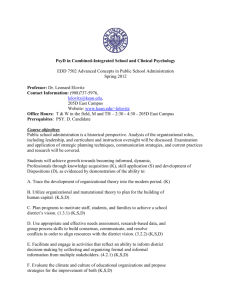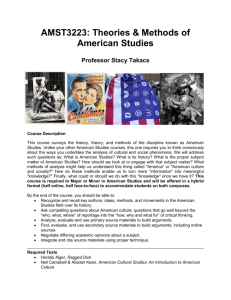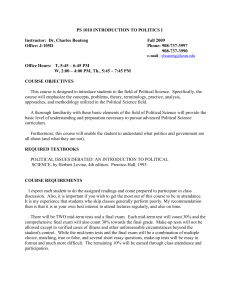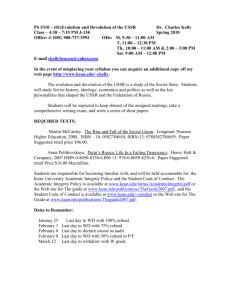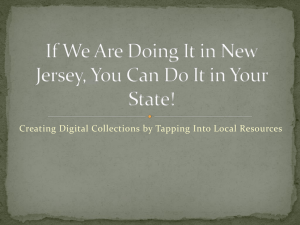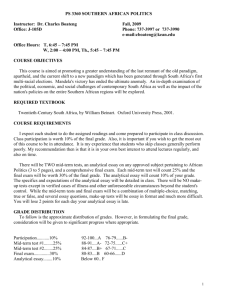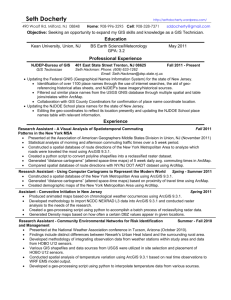Research and Technology Course Syllabus
advertisement
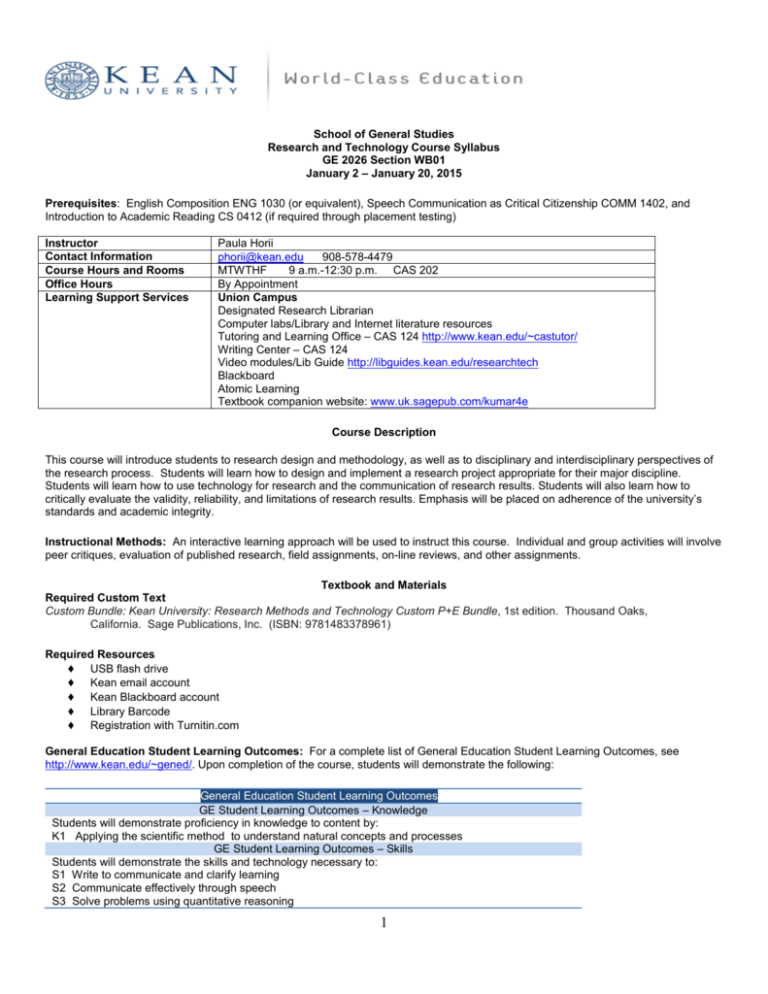
School of General Studies Research and Technology Course Syllabus GE 2026 Section WB01 January 2 – January 20, 2015 Prerequisites: English Composition ENG 1030 (or equivalent), Speech Communication as Critical Citizenship COMM 1402, and Introduction to Academic Reading CS 0412 (if required through placement testing) Instructor Contact Information Course Hours and Rooms Office Hours Learning Support Services Paula Horii phorii@kean.edu 908-578-4479 MTWTHF 9 a.m.-12:30 p.m. CAS 202 By Appointment Union Campus Designated Research Librarian Computer labs/Library and Internet literature resources Tutoring and Learning Office – CAS 124 http://www.kean.edu/~castutor/ Writing Center – CAS 124 Video modules/Lib Guide http://libguides.kean.edu/researchtech Blackboard Atomic Learning Textbook companion website: www.uk.sagepub.com/kumar4e Course Description This course will introduce students to research design and methodology, as well as to disciplinary and interdisciplinary perspectives of the research process. Students will learn how to design and implement a research project appropriate for their major discipline. Students will learn how to use technology for research and the communication of research results. Students will also learn how to critically evaluate the validity, reliability, and limitations of research results. Emphasis will be placed on adherence of the university’s standards and academic integrity. Instructional Methods: An interactive learning approach will be used to instruct this course. Individual and group activities will involve peer critiques, evaluation of published research, field assignments, on-line reviews, and other assignments. Textbook and Materials Required Custom Text Custom Bundle: Kean University: Research Methods and Technology Custom P+E Bundle, 1st edition. Thousand Oaks, California. Sage Publications, Inc. (ISBN: 9781483378961) Required Resources ♦ USB flash drive ♦ Kean email account ♦ Kean Blackboard account ♦ Library Barcode ♦ Registration with Turnitin.com General Education Student Learning Outcomes: For a complete list of General Education Student Learning Outcomes, see http://www.kean.edu/~gened/. Upon completion of the course, students will demonstrate the following: General Education Student Learning Outcomes GE Student Learning Outcomes – Knowledge Students will demonstrate proficiency in knowledge to content by: K1 Applying the scientific method to understand natural concepts and processes GE Student Learning Outcomes – Skills Students will demonstrate the skills and technology necessary to: S1 Write to communicate and clarify learning S2 Communicate effectively through speech S3 Solve problems using quantitative reasoning 1 S4 Think critically using concepts in multiple discipline S5 Demonstrate information literacy GE Student Learning Outcomes – Values Students will exhibit a set of values that demonstrates: V2 Ethical and social responsibility Course Outcomes Upon successful completion of this course, students will be able to: 1. Describe a variety of research strategies and tools ♦ Demonstrate understanding of the purpose and process for conducting research ♦ Explain research design and methodology ♦ Articulate an understanding of research tools 2. Write a formal research paper 3. Present the results of the research ♦ Apply technology to communicate the research question, proposal, findings, etc. 4. Work well with others to conduct projects ♦ Describe disciplinary and multidisciplinary perspectives on the research process and projects studied ♦ Articulate diverse perspectives that contribute to the research process and to the interpretation of results through the examination of variables such as gender, race, religion, age, ethnicity and sexual orientation ♦ Evaluate and critique in a professional manner the oral presentations of other students according to a pre-defined set of criteria established by the instructor 5. Demonstrate information literacy skills through application of research techniques and build upon them when conducting future research projects. 6. Utilize proper citation methods and knowledge of a proper report formation and style system for the following purposes: ♦ Initiate focused research that can lead to answerable questions ♦ Identify the reproducibility and reliability of research results, their interpretation, and their range of validity and application ♦ Actively expand everyday learning through improved research skills ♦ Critically assess research sources for bias by evaluating substantiated arguments and the reliability of results 7. Adhere to University standards of academic integrity in research Assessment The student’s grade for this course will be determined as follows: % 10 20 Activity Research Problem Research Proposal and First Draft: (May include revised research problem, annotated bibliography, literature review, proposed methodology as specified by professor) *A mandatory meeting with Professor to review proposal and/or first draft is required Final Research Paper/Report: (Research Proposal with revisions, collected data, analysis, results and conclusions; include appropriate figures/tables/charts/graphs/references) Tentative Completion by: Week of January 5 Week of January 12 15 Oral Presentation(s) as specified by professor (Handouts) 20 Miscellaneous Assignments: (May include quizzes/tests, external observations, evaluations of published research, grant writing, experience as a researcher, electronic assignments, formal literature review, etc.) (Handouts) Class Participation, Attendance, & Activities: (Group discussions, critiques, electronic assignments) Class time may be allowed for data collection and/or individual meetings (Handouts) Weeks of January 12 and January 19 Assignment (Weekly) 25 10 The following rubrics will be used to assess student learning outcomes: 2 Week of January 19 Cumulative 1) 2) 3) 4) 5) Writing Rubric Speaker Evaluation Form Critical Thinking Rubric Quantitative Reasoning Rubric Information Literacy Rubric Course Requirements and Expectations All students must complete the following, at a minimum, to pass the course: NIH Certification Multiple drafts of research problem Research proposal as specified by professor Research Paper – rough draft and final paper Oral presentation Research Project – Based on a topic approved by your professor, the following elements will be submitted in stages and by specified due dates. ♦ Research problem revised several times ♦ Research proposal following guidelines specified by professor ♦ Rough draft following guidelines specified by professor ♦ Final paper ● Minimum of 15 typed pages of text: 12 pt. font (Times New Roman), double-spaced, 1–inch margins all sides ● Additional cover page including, at a minimum: Title, Student’s name, Course name, Section number, Instructor’s name ● Outline of the paper in the form of a table of contents ● Additional page(s) containing a minimum of properly formatted reference citations ● Proper APA format, or as specified by instructor (MLA, etc.). If the student would prefer to use a different format, this MUST be approved at the beginning of the semester ● Standard English grammar, spelling, and punctuation ● Original work of the student Oral Presentation – Present the research to the class. The following are the minimum criteria for the presentation: ♦ Presentation of 5 – 7 minutes. If additional time is needed, notify the instructor so that the presentation can be effectively scheduled. ♦ Minimum of 6 effectively formatted PowerPoint slides following guidelines specified by professor ♦ Hard copy or emailed copy of presentation, as specified by professor ♦ Original work of the student Miscellaneous Assignments – Students will also be assigned miscellaneous homework assignments that may include the following: ♦ Homework Portfolio – Students will complete a series of assignments to prepare them for their research. ♦ Evaluation of Published Research – You may be assigned to read a published research report and answer specific questions about it. Your answers will demonstrate your understanding of material in the textbook and class lectures. ♦ National Institute of Health Certification Protecting Human Subject Research Participants – You will be required to complete this online training and send the accompanying certificate to professor. ♦ Quizzes – There will be two quizzes to assess your knowledge of the lecture and textbook content. Class Participation, Attendance, Activities ♦ Attendance/Participation – Attendance and participation are mandatory. Being engaged is integral to your success. Texting during class and anything else deemed not on task and/or disruptive will result in a lowering of your participation grade. Oral participation during class is factored into your participation grade. 3 ♦ ♦ ♦ Lateness – Arriving late affects you, your professor, and your classmates. Students not seated by the time attendance is taken will be marked late. Each three late arrivals will be counted as an absence. Please notify me at the beginning of the semester if you have a class that meets on the East Campus or at Harwood the period immediately before our class. Group Discussions and Activities – Students are required to participate in a variety of group discussions based on the readings and/or other assignments. Critique – Students will be required to critique the written and oral performance of their fellow students. Evidence of such critique will consist of written documentation and/or oral commentary. Critiques are expected to be professional, thoughtful, and helpful. Students will be expected to evaluate the usefulness of critiques that they receive. Late Work Policy Assignments and activities need to be submitted at the beginning of class on the day they are due. Absence from class does not waive assignment deadlines. In the case of an absence, it is the student’s responsibility to obtain missed assignments and submit due assignments on time via email. Assignments will not be marked late in the event of a documented emergency. Technology Expectations – Students are required to maintain an active e-mail account during this course. Kean University provides all students with a free account, which should be used. Students are required to evidence competence in the following: ✓ Microsoft Word – for preparation of the paper and development of electronic submissions ✓ Microsoft PowerPoint – to support the oral presentation ✓ Internet tools – Browser and Search Engines – to research assigned topics and interface with the Kean University Library ✓ E-mail – for private communication with the Instructor and fellow students – simple e-mail as well as sending and receiving attachments ✓ Other – as required by instructor or College outline Grading Scale: A = 100-93 A- = 92-90 B+ = 89-86 B = 86-83 B- = 82-80 4 C+ = 79-77 C = 76-70 D = 69-65 F= 64< TENTATIVE CLASS SCHEDULE AND ASSIGNMENT DUE DATES Reading and writing assignments are DUE the class following the date assignments are given—in other words, at the next class. Many class exercises will be based on these assignments, so successful completion of class exercises will depend on the student’s preparation. Please note that dates and assignments are subject to change. Class Schedule and Due Dates WEEK 1 Jan. 2 2 Jan. 5-9 TOPIC Introductions and Overview Course Objectives/What is Research? Readings/ Assignments/Activities Read Chapters 1-2 Thinking Like a Researcher Read Chapter 18 Formulating the Research Problem and Reviewing the Literature Read Chapters 3-6 Conceptualizing a Research Design Read Chapters 7-8 Ethics in Research Read Chapters 9 & 14 Library Visit Research Topic Due (Jan. 6) Submit and Discuss draft of Research Problem/Introductory Paragraph (Jan. 8 and 9) Review Rubrics NIH – Human Subjects Certificate Due by Jan. 9 Quiz I (Jan. 9) 3 Jan. 12-16 External Observation Assignment Due (Jan. 12) Research Strategies: Types of Research Qualitative and Quantitative Approaches Read Chapter 13 Working With Data/Methodology/Statistics Read Chapters 15 & 16 Writing a Research Report Read Chapter 17 Annotated Bibliography Annotated Bibliography Assignment Due (Jan. 13) Outline Outline Due (Jan. 14) First Draft of Research Paper First Draft of Research Paper Due (Jan. 15) Oral Presentations Oral Presentations (Jan. 15 and Jan. 16) Quiz II (Jan. 16) 4 Jan. 19-20 No Class Jan. 19 (Martin Luther King Jr. Day) Oral Presentations (Jan. 20) Oral Presentations Final Draft of Research Paper Due (Jan. 20) Last Day of Class Jan. 20 5 University Academic Integrity Policy “Kean University provides academically rigorous undergraduate and graduate programs that adhere to the twin principles of honesty and academic integrity” –Kean University Academic Integrity Policy. Copying from a book or other material without giving credit to the author, copying other students’ work, doing other students’ assignments for them, or pretending in any way that someone else’s work is yours, is a serious unethical act. It will result in failure in the assignment and possible failure in the course. Extensive or repeated academic dishonesty can result in dismissal from the university. Students are responsible for reviewing and understanding the Kean University Academic Integrity Policy: http://www.kean.edu/admin/uploads/pdf/AcademicIntegrityPolicy.pdf. University Campus Alert System Students are strongly encouraged to register for the University's emergency notification system in order to be informed of campus emergencies, weather notices, and other announcements. Students can register for Campus Alert at one of the following links: http://www.kean.edu/KU/Campus-Alert or http://www.mir3.com/kean. Student Code of Conduct Kean University is committed to providing a campus environment where students can grow intellectually and develop as a people and has a code of conduct to ensure that certain standards of conduct are followed. Students and visitors are expected to uphold and abide by the standards of conduct that form the basis of the student code. Students should review the Student Code of Conduct: http://www.kean.edu/KU/Code-of-Conduct. The Students Rights and Responsibilities handbook is available at: http://www.kean.edu/KU/Forms-Policies-and-Publications. Violations of the code may be received from individuals, police reports or incidents referred through another department within the University. Determination of a violation is made only after a complete investigation of the complaint. A Student Conduct Conference or a Student Conduct Hearing may be held to determine if a violation of community standards occurred. T he O ffice of S tudent C onduct works closely with the Residence Life Judicial System, Greek Life Judicial Board, Office of the Provost/Vice President for Academic Affairs, the Affirmative Action Office, Athletics, and Campus Police. For further information, please refer to: http://www.kean.edu/KU/Code-of-Conduct or visit or call the Office of Student Conduct located in the University Center, Room 315, Phone: (908) 737-5240 or Fax: (908) 737-5245. Americans with Disabilities Statement & Non-Discrimination Statement: Kean University is an affirmative action, equal opportunity institution. Students with documented disabilities who may need special instructional accommodations or who may need special arrangements in the event of an evacuation should notify the instructor as soon as possible, no later than the second week of the term. Students may contact Kean Disability Office in Downs Hall Rm 127 to discuss special needs, (908) 737-4910. KU Non-Discrimination Policy: Kean University is an affirmative action, equal opportunity institution. Kean E-Mail Account Policy All Kean University students must have a valid Kean e-mail account. For those who do not already have one, forms are available online at http://www.kean.edu/KU/forms-OCIS; click on E-Mail Account Request Form. Please allow 5 business days for processing. The completed from should be returned vial mail or in person to: Kean University, Account Request: CSS-113, 1000 Morris Avenue, Union, NJ 07083 6 7
